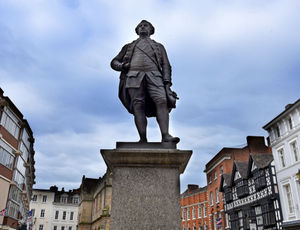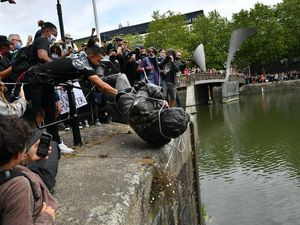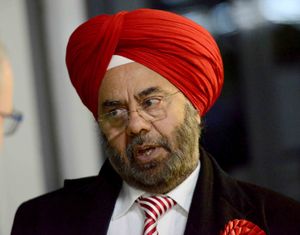Shrewsbury's Clive statue belongs in museum, says Telford councillor born in India
More than 10,000 people have now signed petitions calling for Shrewsbury's Clive of India statue to be removed.

The town centre statue of controversial East India Company man Robert Clive should be placed in a museum, a councillor said.
Debate has raged this week over the statue of 'Clive of India' in Shrewsbury's Square after a statue of slave trader Edward Colston, which stood in Bristol, was toppled and dumped in a bay by protesters on Sunday.
More than 10,000 signatures have been added to two online petitions asking for the Robert Clive statue to be removed.
Clive was born on the Styche Hall estate, near Market Drayton, in 1725 and went to school in London before travelling to India with the East India Company in 1743.
He played a key role in conquering swathes of India for the East India Company in the mid-18th century.
Corruption and looting saw Clive amass a huge amount of wealth and after returning to Britain he was made Baron Clive of Passey, knighted and became Shrewsbury's MP, a position he held until his death.
Many of the treasures Clive and his son Edward acquired from India can be seen on display at Powys Castle.

Telford & Wrekin's former leader Kuldip Sahota, who was born in India, is among those calling for the statue to be taken down.
Councillor Sahota, the Labour representative for Malinslee & Dawley Bank, said: "Robert Clive looted and plundered India while he was there working for the East India Company around the 1750s.
"The scene he created there was one of anarchy, bribery, corruption and extortion on the scale never seen or heard of before.
"His plundering policy caused famine as a result of which millions of poor people died – all this to maximise the profit of the East India Company, and a large proportion of this loot went directly into his pocket when he was sole ruler of Bengal state.

"In 1755 he was ordered to avenge the Black Hole of Calcutta incident [an Indian prison in which prisoners of war were kept in dangerous conditions] and according to Indian historians of the day, he was merciless.
"When some years later the British government heard of his and the East India’s antics, even they were unhappy with his conduct. British historian William Dalrymple called him an 'unstable sociopath'.
"Therefore his statue should be removed from our county town and put in a museum."
'Out of the limelight'
Meanwhile the mayor of Market Drayton said that it was important to ensure the mistakes of the past are not repeated, but condemned "destructive behaviour".
Roy Aldcroft said: "We cannot hide the shameful behaviour which occurred in the past, we can in retrospect ensure that it doesn’t happen again.
"I believe that it is our duty to speak out against racism in all its forms, and to a large extent UK legislation assists with that process. I do believe that ‘bobby bashing’, vandalism and looting has horrified many legitimate protesters on both sides of the pond.
"As for Clive of India’s statue, perhaps it might need to move out of the limelight to reduce sensitivities, but hopefully we will see no more flag burning or destructive behaviour in the capital or Bristol."
Shrewsbury's modern-day MP Daniel Kawczynski has called for a "peaceful" discussion on the future of the statue and says he is conducting "blow by blow" research into Robert Clive's life before passing comment.
The petition set up by David Parton can be viewed here and the petition from Jake Thompson is here.
In brief: Who was Robert Clive?
Clive was born on the Styche Hall estate, near Market Drayton in 1725 and went to school in London before travelling to India with the East India Company in 1743.
After two years in Britain, in 1755 Clive returned to India and two years later retook Calcutta (now Kolkata) for the company at the Battle of Plassey, a key moment on Britain's path to controlling Bengal and then India for almost two centuries.
Corruption and looting saw Clive amass a huge amount of wealth and he returned to Britain in 1760, aged 34.
He was made Baron Clive of Passey, knighted and became Shrewsbury's MP, a position he held until his death.
He went back to India in 1765 for two years before returning to Britain where the activities of Clive and the East India Company in India came under sustained attack. The famine of Bengal that lasted between 1769 and 1773 was said to have largely been caused by the company's policies.
Clive defended himself in Parliament, saying "I stand astonished at my own moderation," and in 1773 Parliament declared that he did “render great and meritorious services to his country.”
He died at his house in London aged 49 and is believed to have killed himself.
Many of his treasures are now on display at Powys Castle in Welshpool.




